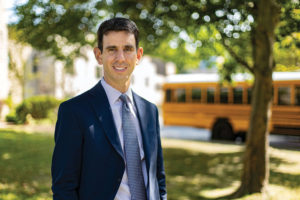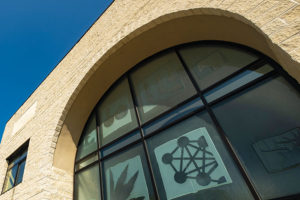A good athletics program doesn’t just teach kids about the importance of health and physical fitness.
It also provides them with the tools for developing self-awareness and self-confidence, and fosters teamwork and collaboration.
Schechter Westchester’s K-12 athletics program is built to do just this and has something for everyone, from novice athletes to seasoned players. The school offers an expansive program that begins with elementary school Physical Education (PE) classes and culminates in a highly competitive high school varsity sports program, all at the school’s top-notch facilities. SW teams face tough competitors in the New York State Public High School Athletic Association and have brought home some coveted trophies. But SW players are more than just gifted athletes; they are also proud young Jews whose religious identity informs how they handle themselves both on and off the field.
Lower School Athletics
Where Team-Building is Child’s Play:
Some of the first sounds you hear around the Lower School are the cheers and squeals of delight coming from the enormous gym in the center of the school. Lower School Physical Education teachers Liam Imondo (aka “Mr. I”) and Matthew Simone are responsible for all of this fun, teaching SW’s youngest students basic skills like rolling, striking, and skipping and then conjuring up imaginative games which challenge them to collaborate. Their favorite game is “Survivor,” a race where kids work in teams and use giant foam pieces to build a bridge across an imaginary river. The race is not won until every member of the team makes it across, teaching students valuable social skills in tandem with physical ones. The impressive facilities at the Lower School — including a huge gym, a sprawling field, two playgrounds, and a nature trail — allow the teachers to get creative with movement both indoors and out.
Imondo and Simone aim to instill confidence in the children. Starting in second grade, students learn the rudiments of team sports like soccer, baseball, basketball, and floor hockey. When practicing skills, students have three options: easy, medium, and difficult. “We accommodate every skill level,” says Simone, “so every student can feel some measure of success.” Students have the opportunity to show off their abilities in the Fourth- and Fifth-Grade Olympics, competing in modified versions of Olympic sports such as “swimming” on floor scooters and “ice skating” on foam blocks.
The teachers are always aware of marrying PE’s physical benefits with its socio-emotional ones. “The most important lesson I teach my students is to enjoy some kind of movement,” says Simone. ”I want them to be fit and confident for the rest of their lives.” Adds Imondo, “Our mantra is win without boasting; lose without blaming.”
Upper School Athletics
Where Jewish Identity Meets Sportsmanship:
Once SW students reach the Middle School, they are eligible to train and compete on a variety of modified sports teams (see “Something for Everyone” for a complete list). Some elite athletes are invited to try out for High School teams in eighth grade. The SW Lions play on the Upper School’s manicured fields and newly resurfaced basketball and tennis courts. They compete in a public school conference rather than a Yeshiva league because it creates a more competitive program. According to High School Principal Eric Bassin, there is also value in “taking one’s Jewish identity into contexts where kids are different from you. Our athletics program shows our students that you can be a serious, observant Jewish person and a normal American teen all at once.”
As Upper School Athletics Director Scott D’Ottavio observes, “Our teams are highly competitive, despite the fact that we don’t practice on Shabbat. We often play schools that have a larger enrollment, so we don’t have as deep a pool to draw from as some of the public schools. But our kids have this aura of confidence, hard work, and discipline. They feel special, like they are representing being Jewish and their school as we compete. That’s why we often win.” In fact, this year, the Boys and Girls Varsity Soccer teams, coached by Bryan Lamana and Chelsey Feldman, both won league titles and headed into the Class C New York State Public High School Athletic Association tournaments as number one seeds.
In November 2015, the members of the Boys Varsity Soccer team had an opportunity to model this duality — fiercely competitive athlete and observant Jew — when they made the Class C New York State Finals and the games fell on a Saturday. As it had done in similar situations previously, SW was determined to enable the team to compete while still fully observing the rules of Shabbat. So the school rented most of a Howard Johnson’s nearby and built two entire Shabbatonim where players, families, and fans could worship together. The Lions and their entourage walked the nearly two-mile distance from the Shabbatonim to the tournament together, where they won in the semifinals but lost in the finals. Given the spiritual context of what they accomplished, they still felt like winners.
Competing on these teams provides student athletes with a sense of belonging to something bigger than themselves. “I learned that sportsmanship means more than just shaking hands with the other team,” shared Miles Ogihara, a senior on the Boys Varsity Soccer team. “Sportsmanship means representing the secular and Jewish values my school stands for and conducting oneself on the field in a way that embodies a moral person.” And Junior Varsity soccer player Alexa Cotel-Altman described the confidence she gets from working as a team: “I can count on each player to have my back … There is nothing more special than an unbreakable bond between teammates.”


